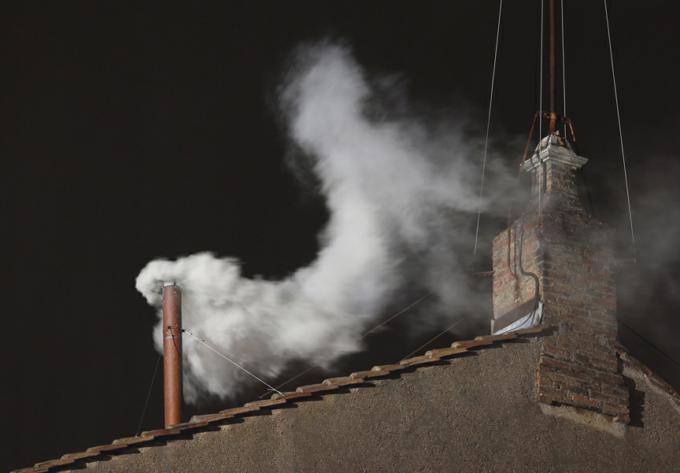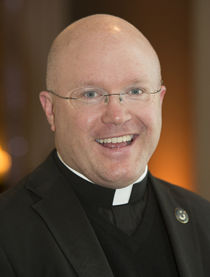
Faith
In every papacy, there are some who are better at complaining about the pope than praying for him. It's a good practice to challenge those who criticize the pope whether they pray for him as much as they protest.

Landry
Ten years ago this Monday, March 13, at 8:22 p.m. Rome time, the 266th Peter walked out for the first time onto the Balcony of Blessing in the center of the faÇade of St. Peter's Basilica in the Vatican. After greeting us, he led us in prayer for the recently retired Pope Benedict XVI. Before he gave us his customary first blessing as the new Bishop of Rome, he asked us a "favor."
He humbly implored, "I ask you to pray to the Lord that he will bless me," and bowed his head in silence as those in a hushed St. Peter's Square and across the world quietly prayed for him. After giving us his blessing, he thanked us, wished us a good night, and repeated the petition, "Pray for me."
He has been insistently asking us to pray for him ever since, in every language he can utter the phrase, at the end of almost every encounter.
To pray for Pope Francis is the best way to mark his 10th anniversary.
Prayer is what Catholics ought always to do first and do best.
The Church prays for the pope in every Mass from the rising of the sun to its setting. With 407,000 priests in the world, celebrating daily, Sunday, funeral, and nuptial Masses, the pope likely has 600,000 to a million Masses a day offered for him, a prayer meant to bring us into greater communion.
Catholics also pray for him in the petitions in the Liturgy of the Hours, at the beginning and end of the rosary, and in various other spontaneous supplications made to the One whom he serves as earthly vicar.
The ancient prayer for the pope, sung regularly in the Vatican in Latin and found in prayer books and hymnals everywhere, is paraphrased from Ps 41:3: "May the Lord preserve him, give him a long life, make him blessed upon the earth, and not hand him over to the power of his enemies."
That invocation finishes with a beautiful concluding prayer that synthesizes the Church's faith in the divine provenance and purpose of the Petrine office:
"O God, Shepherd and Ruler of all the faithful, look down in your mercy upon your servant, Francis, whom you have appointed to preside over your Church, and grant, we beseech you, that both by word and example, he may edify all those under his charge so that, with the flock entrusted to him, he may arrive at length unto life everlasting."
That is a fitting prayer for the whole Church to offer in unison on Monday.
Pope Francis has often spoken about how much he depends on the prayers of the faithful. In his first airplane press conference, returning from World Youth Day in Brazil four months after his election, an inquiring journalist asked why he so often asked us for prayers. "We're not used to hearing a pope," the reporter said, "ask so often that people pray for him."
Many people can naively think that the pope doesn't need prayers. If he has Jesus Christ praying for him (Lk 22:32), they can wonder, why does he need us? Moreover, if he's supposed to be interceding for us before God, why do we need to intercede for him?
Pope Francis responded to the journalist: "Because I sense that if the Lord does not help in this work of assisting the People of God to go forward, it can't be done. I am truly conscious of my many limitations, with so many problems, and I am a sinner, as you know, and I have to ask for this. But it comes from within! I ask Our Lady, too, to pray to the Lord for me. It is a habit ... that comes from my heart and also a real need in terms of my work."
Pope Francis seems to recognize that prayers for the pope cannot be taken for granted. When he came to the United States in 2015 and visited Our Lady Queen of Angels School in the Bronx, the Holy Father said to the students before leaving, "I want to give you some homework. Can I? It is just a little request, but a very important one. Please don't forget to pray for me!"
We've all received from him the same assignment.
Devout prayers for the popes began to increase in regularity and intensity two centuries ago when Napoleon kidnapped Pope Pius VI in 1798 and brought him to live and ultimately die in Valence, France, preventing his body to be buried for five months or returned to the Vatican for more than two years. Such prayers grew when in 1809, Napoleon abducted Pope Pius VII and kept him in captivity for five years, until Napoleon and the French were finally defeated.
Prior to that point, many, especially in Europe, had been tempted to view the pope less as a spiritual figure than as the civil monarch of the Papal City States. But when the pope was seized, maltreated and imprisoned by a megalomaniacal dictator, Catholics throughout the globe began to pray for his safety, health, release, and intentions. Catholic piety has been positively impacted ever since.
To pray for the pope implies a recognition that the pope, like everyone, needs them, and with his responsibilities very likely needs them more, since Satan continuously seeks to sift the pope like wheat (Lk 22:31).
In every papacy, there are some who are better at complaining about the pope than praying for him. It's a good practice to challenge those who criticize the pope whether they pray for him as much as they protest.
To pray for the pope does not mean one approves of every decision he's made or even the general direction of the papacy. Pope Francis himself humbly recognizes his "many limitations," "problems," and sins, and in various pre-papal and papal interviews, he has candidly admitted that his first take on many decisions is often erroneous.
And so praying for the pope is not inconsistent with sincere concerns, for example, over the way he is handling various crises in the Church, responding to certain scandals, or handling liturgical matters. It doesn't imply one agrees with the wisdom of everything he's said, written or done. It doesn't mean one deems prudent every curial, episcopal or cardinalatial appointment.
Prayers aren't supposed to come just from cheerleaders after all, but from every loyal spiritual son and daughter, and the more honest concerns people have, the more frequent and fervent they should pray.
Prayers for the Pope can, therefore, justly ask God to give him the wise and understanding heart that Solomon beseeched, so that he might govern God's people wisely (1 Kings 3:9). They can implore that he grow in docility to the Holy Spirit as he seeks to guide the Church into all truth (Jn 16:13). They can beg that he be given a tongue of fire to teach and defend the faith with zeal and clarity. They can humbly beseech that God persuade him to reverse some of the reversible decisions he's made. They can pray for the pope's and their own continual conversion and even, when the circumstances warrant it, for a merciful and blessed death.
But sincere prayers for the pope ought to be a daily practice for every Catholic -- for his good and the good of the whole Church.
Therefore, as we mark pope Francis' tenth anniversary, let's give him what he has never ceased to ask for as a "favor," but which is in fact our loving Christian duty.
- Father Landry is a priest of the Diocese of Fall River who is national chaplain to Aid to the Church in Need USA, a Papal Missionary of Mercy and a Missionary of the Eucharist for the US Bishops.
Recent articles in the Faith & Family section
-
Did you know?Father Robert M. O'Grady
-
Sowing the Seeds of FaithMaureen Crowley Heil
-
Bread left overScott Hahn
-
Scripture Reflection for July 28, 2024, Seventeenth Sunday in Ordinary TimeJem Sullivan
-
What the universal call to holiness entailsDr. R. Jared Staudt


















